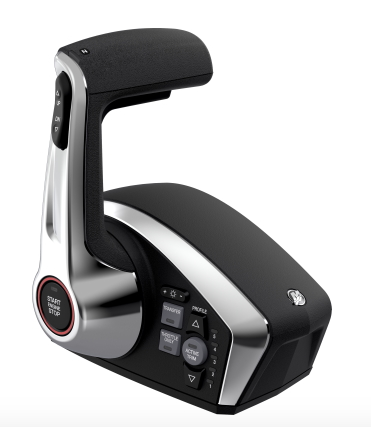Mercury introduces its next‑generation Digital Throttle & Shift system

Mercury Marine introduced the next generation of its Digital Throttle & Shift (DTS) system with integrated, intuitive and intelligent technology.
The Next Gen DTS sytem comes with all the best attributes of the successful DTS system that Mercury launched in 2004, including smooth and ultra‑responsive throttle performance with zero hesitation and full integration with SmartCraft digital technologies. Representing a major step in the product’s evolution, the Next Gen DTS system brings together an enhanced operating system, improved ergonomic designs for the electronic remote controls (ERC) and additional user‑friendly features.
The new system is replacing the former control system for use with all DTS‑compatible Mercury sterndrive, inboard, diesel and outboard engines. The Verado engine family, including the all‑new V12 600hp Verado outboard, comes standard with Next Gen DTS controls.
“When we were creating the Next Gen Digital Throttle & Shift system, we aimed to improve the boating experience with an intuitive design and simpler access to the features boaters use most often,” said Tyler Mehrl, category manager for steering and controls at Mercury.
Included among the enhancements, Active Trim activation and adjustment buttons are now integrated on the Next Gen DTS control base, eliminating the need for an additional control panel on the dash. Active Trim automatically and continuously adjusts engine trim based on changes in GPS speed to improve performance, fuel economy and ease of operation.
Next Gen DTS leverages a robust operating system that not only supports basic functions but also has been upgraded to intelligently and automatically enhance throttle control for connected SmartCraft systems such as Joystick Piloting and Skyhook.
The new ERC lineup offers solutions for boat‑engine configurations ranging from one to six Mercury engines. For single‑engine configurations, there are panel‑ and console‑mount controls. For multi‑engine configurations, boaters can choose the standard dual‑handle console‑mount controls or the Premier dual‑handle model, which includes an innovative digital display integrated into the control base. The display provides a broad variety of context‑sensitive information to help the boater stay fully connected with the propulsion system through all phases of boat operation.
Each control has the same sleek, chrome‑on‑black aesthetics and dynamic styling that are consistent with the current “Mercury DNA” overseen by Todd Dannenberg, Mercury director of industrial design.
“The ergonomics provide a very natural connection that invites the boater to push the throttle and feel the engine’s power. Plus, there are intuitive new features that improve the user experience, which we derived through intensive usability testing,” Dannenberg said.
Additional features include a green neutral‑indicator light on the throttle handle(s) that quickly confirms gear position, a convenient throttle‑only feature for starting and warming the engine(s), a large start/stop button and an oversized trim switch. Multi‑engine controls have a start/stop‑all button for all engines and buttons for starting and stopping individual engines, as well as the ability to trim all or individual engines.
Single‑engine controls are available with a Quick Steer button on boats that have the Mercury Single Outboard Electric Steering system installed. Quick Steer — an industry‑first technology — enhances steering control for low‑speed, close‑quarters maneuvering. This setting provides full turning capacity for the boat with only a quarter‑turn of the steering wheel to the left or right. The enhanced steering authority eases the process of docking and maneuvering in tight spaces.
“We incorporated an incredible range of features designed to improve the experience of operating single‑ and multi‑engine boats,” said Mehrl. “The intuitive design means there’s very little learning curve to be able to enjoy a huge performance advantage.”





